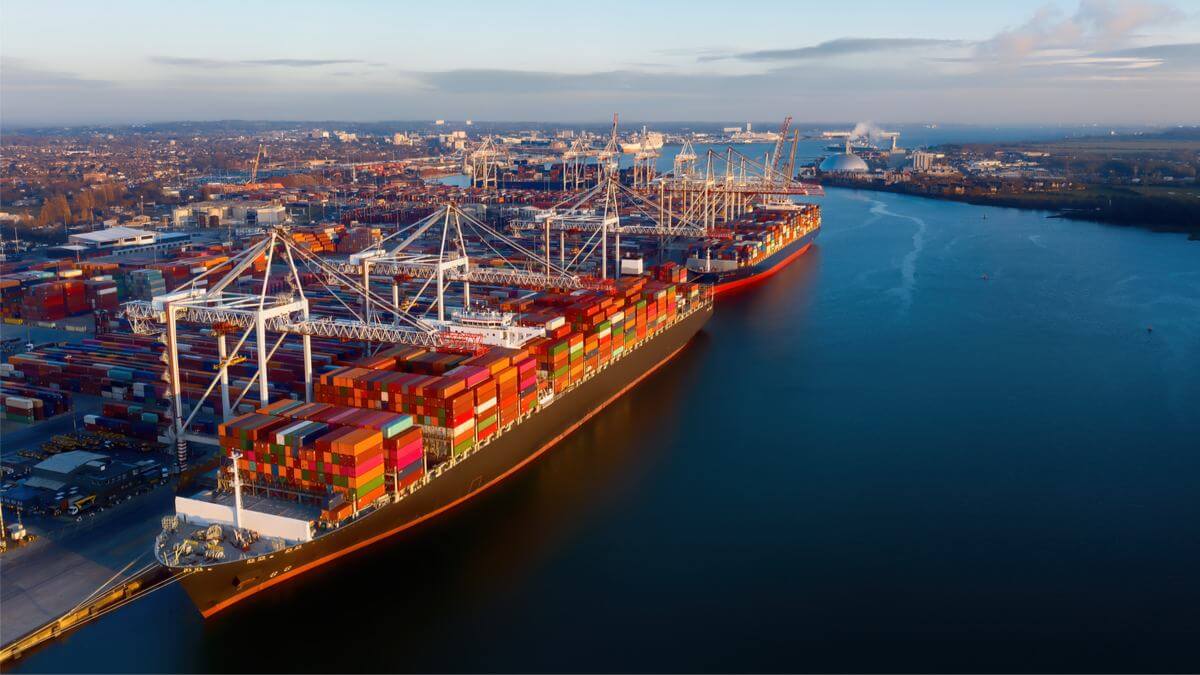New year, new steer? Key takeaways from our end-of-year event with SeedLegals
Earlier this month, we hosted a festive end-of-year event with our partners at SeedLegals. The evening brought together an inspiring group of founder and...

Interested in importing goods from the EU? If your business is setting up links with international suppliers based in Europe, you’ll need to understand how the importing process works.
Unfortunately, importing goods from the EU to the UK has become more complicated since Brexit. Depending what you’re bringing into the country, there are new customs declarations and changes to taxes and duties to be aware of.
To help make it just a little easier for UK businesses, we’ve put together a complete guide on how to import goods to the UK from the EU. We’ll run through the step-by-step process, including everything you need to know along the way.
We’ll also show you a cost-saving way to pay your EU suppliers in their own currency - using a Wise Business account.
💡Learn more about Wise Business
Let’s start with the answers to some frequently asked questions about importing goods from European countries into the UK.
If you’re starting from scratch, you’ll need to set up your import business by completing the following steps:
Looking for inspiration on what goods to import, or want to find a gap in the market? Here’s a short list of the most commonly imported goods from the EU to the UK (in 2022):²
- Machinery and transport equipment (36%)
- Chemical products (16.8%)
- Foodstuffs, beverages, and tobacco (8%)
- Base metals (5.8%).
Importing goods from the EU to the UK after Brexit has unfortunately become slower, more complicated and potentially more costly too.
Here’s a quick overview of the changes (although it’s recommended to do further reading, as some of the new rules can be complicated):³
- Goods can continue to be imported tariff and quota free, but only if they pass ‘Rules of Origin’ requirements. This establishes the origin of the goods as an EU country, with the aim of preventing goods from third countries being routed through the EU/UK in order to avoid tariffs.
- Customs declarations are required for all imported goods.
- Importers must pre-notify for certain imports, such as animals, plants and some other products. Some of these goods may also require health certificates and checks.
There may also be additional changes on the horizon. The UK Government is planning to roll out requirements for full SPS (sanitary and phytosanitary) checks on EU imports in April 2024, and Safety and Security declarations for EU imports in October 2024.³
Import duty is another term for customs charges, which are paid when bringing goods of a certain value into the UK from overseas.
In the UK, import duties are payable on most goods with a value of £135 or more.⁴ To calculate how much you’ll need to pay, the first step is to look up the right commodity codes for the goods you’ll be importing. The UK Government has a handy tool you can use for this here.
Once you have your commodity codes, there are a few different methods for calculating import duties. You’ll find full guidance on these here.
It’s important to note that import duty is different to import VAT for EU to UK goods. We’ll run through this in more detail next.
Alongside import duty, you may also have to pay something called import VAT when you import from the EU to the UK.
Import VAT is a tax paid on goods brought into the UK from another country. It’s charged on all goods, except for gifts worth £39 or less. It’s also useful to know that VAT is payable on the full package value, including postage, packaging, insurance and any customs duties owed. It is charged at the VAT which applies to the category of goods.⁴
Import VAT is usually charged alongside import duties, so importing businesses are likely to have to pay both. However, it may depend on your business model, turnover and contracts.
Now, let’s turn to the actual process of buying goods from the EU and importing to the UK. Below, you’ll find a step-by-step guide covering what to expect, and what you’ll need to do as an importing business based in the UK.
One of the first things you’ll need to do is research, which includes finding, choosing and negotiating with European suppliers.
There are a few different ways to find potential suppliers, including trade fairs, online B2B marketplaces, trade associations and sourcing agents. You can also use recommendations from other importers working within the same markets.
It’s crucial to ensure that any suppliers you work with are properly set up to export to the UK. They may need a licence or certificates to send goods to the UK, along with needing to make export declarations in their own country.
You’ll need to do your due diligence when it comes to the quality of goods, starting with requesting sample products. Suppliers you work with should be able to provide the required documentation for their goods.
You should also assess suppliers on their communication, commitment to meeting delivery schedules and reputation within the wider market.
Once you’ve found your suppliers, the next step is to negotiate prices. With that settled, you’ll need to agree on payment terms. Some of the most common payment terms when importing to the UK include the following:⁵
- Open account
- Letter of credit
- Bank collection
- Advance payment.
You’ll also need to choose a payment method that works for both parties.
For importers, a Wise Business account could be the ideal solution. It’s a powerful multi-currency account that lets you pay suppliers in their own currency, whether it’s euros, Swiss francs or Polish zloty.
Any required currency conversions are carried out using Wise’s mid-market exchange rate. This, combined with low, transparent fees, could make Wise a cheaper option than using your bank to pay overseas suppliers.
🌍 Pay EU suppliers easily with Wise Business
Before you can finalise your first order with your new EU supplier, you need to arrange transport from the EU to the UK.
Available options include air freight and sea freight. Air freight is the fastest, although it can be the most expensive. Sea freight is slower but more affordable.
Depending where in Europe you’re importing from, you’ll also have the option of importing by rail or road. These offer flexibility and potential cost savings, although of course it depends on the route, along with rail and road networks.
You can also work with a freight forwarding service, who can handle the process for you.
To get ready for customs at the UK border, you’ll need to do the following:
Importing and customs processes for the UK may be a little complex, but paying your EU suppliers doesn’t have to be.
Open a Wise Business account and you’ll be able to pay suppliers in their own currency. You can send euros or 40+ other currencies in just a few clicks. You can easily make batch payments when paying multiple suppliers at once, and even automate the process using the Wise API to save even more time.

Wise payments are fast and fully secure (even for large amounts). Best of all, you’ll only pay low, transparent fees and always get mid-market exchange rates.
This is the rate that banks use to buy and sell currency, and is widely considered the fairest rate you can get. When banks carry out currency conversions on behalf of customers, they usually add a mark-up or margin to the exchange rate. This makes it more expensive for you, as less of your money reaches your recipient.
Please see theTerms of Use for your region or visitWise fees & pricing for the most up-to-date information on pricing and fees.
Get started with Wise Business 🚀
And that’s it - your comprehensive guide to importing goods from the EU to the UK. We’ve covered it all, from finding suppliers to calculating import duty and completing customs declarations. This should be a good starting point for anyone looking to set up an import business in the UK.
*Disclaimer: The UK Wise Business pricing structure is changing with effect from 26/11/2025 date. Receiving money, direct debits and getting paid features are not available with the Essential Plan which you can open for free. Pay a one-time set up fee of £50 to unlock Advanced features including account details to receive payments in 22+ currencies or 8+ currencies for non-swift payments. You’ll also get access to our invoice generating tool, payment links, QuickPay QR codes and the ability to set up direct debits all within one account. Please check our website for the latest pricing information.
Sources used for this article:
Sources checked on 07-12-2023.
*Please see terms of use and product availability for your region or visit Wise fees and pricing for the most up to date pricing and fee information.
This publication is provided for general information purposes and does not constitute legal, tax or other professional advice from Wise Payments Limited or its subsidiaries and its affiliates, and it is not intended as a substitute for obtaining advice from a financial advisor or any other professional.
We make no representations, warranties or guarantees, whether expressed or implied, that the content in the publication is accurate, complete or up to date.

Earlier this month, we hosted a festive end-of-year event with our partners at SeedLegals. The evening brought together an inspiring group of founder and...

Learn about the corporate tax system in Ukraine, its current rates, how to pay your dues and stay compliant, and best practices.

Learn about the corporate tax system in Kenya, its current rates, how to pay your dues and stay compliant, and best practices.

Learn about the corporate tax system in Ghana, its current rates, how to pay your dues and stay compliant, and best practices.

Learn about the corporate tax system in Uruguay, its current rates, how to pay your dues and stay compliant, and best practices.

Learn about the corporate tax system in Tanzania, its current rates, how to pay your dues and stay compliant, and best practices.